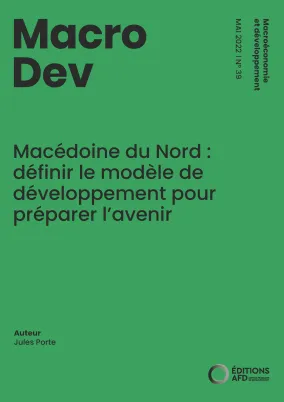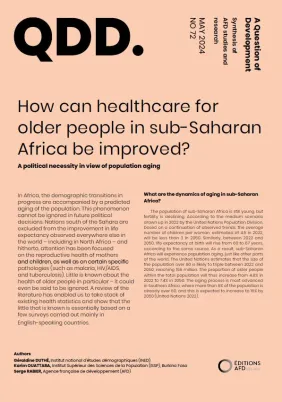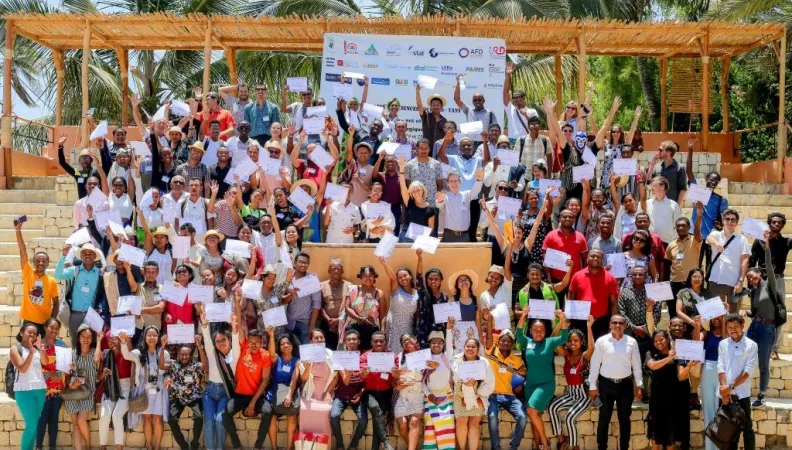 Closing ceremony of the Tany Vao 2022 summer school in Madagascar. PAIRES is a partnership between the AFD and the French National Research Institute for Sustainable Development (IRD) that funds a series of impact assessments of development interventions supported by AFD, with a focus on research from the Global South.
Closing ceremony of the Tany Vao 2022 summer school in Madagascar. PAIRES is a partnership between the AFD and the French National Research Institute for Sustainable Development (IRD) that funds a series of impact assessments of development interventions supported by AFD, with a focus on research from the Global South. Context
Impact assessments aim to provide information on the effectiveness of projects in producing concrete development results. Specifically, the objective is to estimate whether the effect observed following an intervention is actually attributable to that intervention, and to what extent. To do this, assessments rigorously measure the effects of interventions using quantitative, qualitative, geospatial, or mixed method.
With the aim of strengthening research skills and practices in the Global South in the field of impact evaluation, enriching dialogue with public authorities and stakeholders on development projects, and fostering academic debate on key development issues, a partnership between the French National Research Institute for Sustainable Development (IRD) and AFD was established in 2020 to identify and implement a series of impact evaluations of interventions supported by the AFD. The IRD provides the expertise, networks, and operational capacity to carry out these evaluations with partners in the Global South. The partnership was extended in October 2024, which will allow for the selection of new projects for evaluation.
This project takes place in a context when there are growing expectations for evaluations that provide a better understanding and measurement of the results and impacts of development interventions. It contributes to meet these expectations in the same way as other types of evaluation, particularly project evaluations carried out by French cooperation actors.
The IRD is recognized for its scientific excellence, its multidisciplinary approach, its experience in conducting impact evaluation, and its local presence, which enables it to develop close ties with university teams and national statistical institutes in the South with which it can collaborate. This collaboration is also part of a shared research agenda and is covered by an institutional partnership between the AFD and the IRD.
See also : Evaluer l'impact des projets de développement : l'AFD et l'IRD prolongent le partenariat PAIRES
Objectives
The PAIRES program funds impact evaluations of development projects financed by the AFD Group, with three objectives:
- To enrich dialogue with public authorities and stakeholders on development projects and their results;
- To strengthen the role, skills, and practice of research in the South in the field of impact evaluation;
- To foster academic debate on key development issues.
Method
Impact evaluations use methods derived from social science research to identify and measure the effects that are strictly attributable to an intervention. Quantitative methods generally involve comparing changes in the situation of the population benefiting from the intervention with those of a population that has not been exposed to the intervention but is comparable to the beneficiary population. Impact evaluation, generally using counterfactuals, therefore makes it possible to isolate the causal effect of an intervention on a variable of interest and to quantify that effect.
Beyond promoting impact evaluations, the PAIRES partnership promotes multidisciplinary evaluations, combining quantitative and qualitative methodologies in order to strengthen the lessons learned about the mechanisms underlying change (or the absence of change).
In addition, the PAIRES program involves researchers from the countries of intervention in all its studies to ensure that the specificities of each context are taken into account and with a view to capacity building.
Results
During its first five years of implementation, PAIRES has mobilized six French research laboratories and eight laboratories in the Southern countries concerned. A total of eight impact evaluations, seven feasibility studies, and four training courses have been funded since the project began.
The ongoing impact evaluations cover 11 countries and various sectors (health, energy, biodiversity, education, gender equality, microfinance, agriculture). They have enabled collaboration with several academic, public, and civil society institutions in France and in countries of the Global South. Other assessments are currently being identified.
In terms of capacity building, PAIRES has organized a summer school and two training courses in geospatial impact evaluation in Madagascar. The program has also funded two joint doctoral contracts between the University of Antananarivo and Paris Saclay University for the BETSAKA project.
Lessons learned from impact assessments
Find below the publications and blog articles related to the impact assessments funded under the PAIRES partnership.
The REDGAS assessment aimed to quantify the health, economic, and social impacts of access to gas cooking for households in Burkina Faso.
Publications :
- REDGAS : Retours sur l’enquête de situation de référence
- Mesures de l’exposition des personnes aux particules fines par méthode gravimétrique dans le cadre de l’étude REDGAS
- Pollution de l’air et consommation de bois au Burkina Faso
- Se baser sur le terrain pour mieux cibler l’intervention : Une étude socioanthropologique en baseline
- Seroprevalence and risk factors for SARS-CoV-2 infection in middle-sized cities of Burkina Faso: A descriptive cross-sectional study
- Reducing Pollution from Cooking Smoke: key lessons from the REDGAS randomized study in Burkina Faso
- Présentation du projet et de ses résultats
- Clean Cooking: Insights from two new AFD and FID Experiments
Do forest management plans contribute to promoting the sustainable use of forest resources in the Congo Basin?
Publications :
- Impact Evaluation Study of Forest Management Systems on the Forest Cover in the Congo Basin
- Do forest-management plans and FSC certification help avoid deforestation in the Congo Basin?
- Focus : Plans d’aménagement forestier et conditions de vie des populations des forêts d’Afrique centrale
- Plans d'aménagement forestier et conditions de vie des populations des forêts d'Afrique centrale : une revue de la littérature
The BETSAKA project (Biodiversity-economic tradeoff and synergy assessments for conservation areas): what are the environmental and socioeconomic impacts of terrestrial protected areas in Madagascar from 2000 to 2024?
Publications :
What has been the impact of the Health Voucher on the use of maternal health services by pregnant women in Cameroon?
Publications :
- Coming soon
What is the impact of a parenting education program on children's cognitive and non-cognitive development?
Publications :
What is the impact of viewing awareness videos on domestic violence on knowledge, attitudes, and reporting of domestic violence?
Publications :
How does education through sport help transform gender attitudes and behaviors among middle school students?
Publications :
Contacts :
- Flore Gubert, IRD Scientific Coordinator
- Ingrid Dallmann, AFD Project Manager
- Juliette Maunoury, IRD PAIRES Project Coordinator
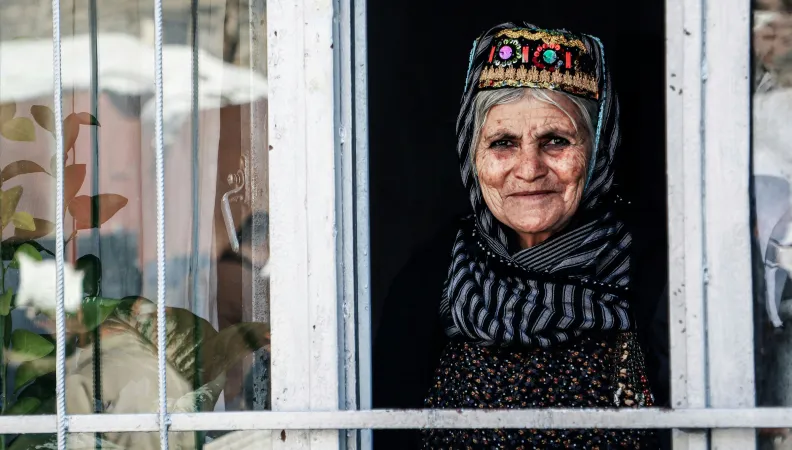 © Public domain Focusing on three countries in the Western Balkans (Albania, Bosnia and Herzegovina, North Macedonia), this multidisciplinary research project will explore the challenges of demographic aging and how they impact socio-economic and climatic contexts, as well as current and future public policies in each country studied.
© Public domain Focusing on three countries in the Western Balkans (Albania, Bosnia and Herzegovina, North Macedonia), this multidisciplinary research project will explore the challenges of demographic aging and how they impact socio-economic and climatic contexts, as well as current and future public policies in each country studied.
Context
According to the United Nations, aging is an “unprecedented event in human history.” The year 2020 marks a historic turning point: the curves showing the proportion of people aged 65 and over on the one hand, and people under the age of five on the other, are crossing and heading in sharply divergent directions.
These changes, already underway in Europe and the Balkans, herald major health, social, and economic challenges in the coming decades, as well as a demographic decline that is already underway. To address these challenges, it will be necessary to confront inevitable changes in lifestyles, increase investment in social protection policies, reform institutions, and encourage technological innovation. Without specific public policy actions, the decline in the working-age population will make it more difficult to support retirees, age-related health problems will worsen, and the quality of life of older people will be reduced.
Objectives
This research project aims to identify, describe, and clearly analyze the links between demographic dynamics and socio-economic issues in three countries in the Western Balkans.
To this end, it focuses on population dynamics (mortality/morbidity, aging, migration) and patterns of (de)population and land use planning (territorial identities, urbanization/rural areas, particularly in relation to natural environments). It will also analyze their impacts and interactions with current and future socio-economic issues in each of the three countries concerned (women's access to the labor market, migrant remittances, changes in social protection systems, etc.).
The aim is to clearly identify, describe, and analyze these links, both to inform academic research and to inform public policy choices in the three countries concerned. AFD will also be able to use these results in its discussions with public authorities in Albania, Bosnia and Herzegovina, and North Macedonia.
Method
The project is led by a scientific partner, the Center for Research and Policy Making (North Macedonia), who assembled a multidisciplinary team of experts in demography, migration, economics and financial policy, employment and labor mobility, gender equality, the environment, and social protection policies (health and retirement).
Expected results
This multidisciplinary project (sociology, political science, economics) is structured around three components:
- Production of an academic literature review on the challenges of aging in the Balkans region (advances and scientific knowledge on the socio-economic, territorial, and migratory challenges related to aging at the regional level);
- Three country studies;
- Publications and promotional activities to disseminate knowledge on the one hand and fuel dialogue between AFD and its public partners on the other.
Want to stay updated on AFD’s latest research?
For further reading
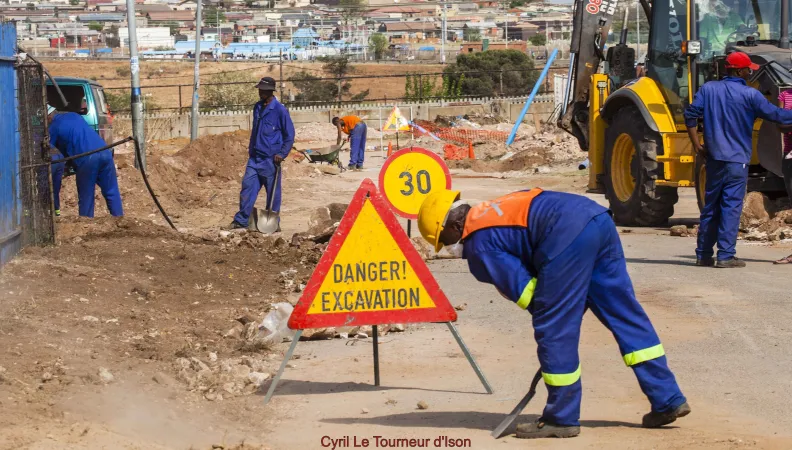 Legal notice EU (project) What is the role of Public Employment Programmes (PEPs) in South Africa’s social protection system, and how do they contribute to employment, inclusion, and inequality reduction? The Extension of the EU-AFD Research Facility on Inequalities program seeked to answer this question.
Legal notice EU (project) What is the role of Public Employment Programmes (PEPs) in South Africa’s social protection system, and how do they contribute to employment, inclusion, and inequality reduction? The Extension of the EU-AFD Research Facility on Inequalities program seeked to answer this question.
Context
In South Africa, escalating unemployment, rising poverty and structural inequality remain persistent challenges, with young people and marginalized communities disproportionately affected. Many workers remain excluded from stable formal employment, and rely on social grants for basic income security. PEPs have emerged as a key policy instrument to address these structural gaps, providing temporary work, income support and skills development opportunities.
These programmes operate alongside traditional social protection measures, including cash transfers and grants. While PEPs offer immediate employment and income, it is critical to understand their broader impact beyond income effects, and how they intersect with poverty reduction, inclusion, and long-term labour market outcomes.
This project is part of the Extension of the EU-AFD Research Facility on Inequalities. Coordinated by AFD and financed by the European Commission, the Extension of the Facility will contribute to the development of public policies aimed at reducing inequalities in four countries: South Africa, Mexico, Colombia and Indonesia over the period 2021-2025.
Objectives
To better understand the role of PEPs within South Africa’s evolving social protection landscape, this study analyzed how they intersect with unemployment, inequality, and social policy. The study highlighted structural inequalities – such as land dispossession, concentrated economic power, and spatial inequities – that perpetuate poverty and unemployment.
In particular, the paper focused on redefining the relationship between social assistance and public employment. The study explored how PEPs can go beyond merely providing income support to leveraging the added value of work, enhancing social inclusion, and fostering skills development. The study revealed how integrated and differentiated strategies are needed in order to address the diverse labour market challenges by advocating for scalable, rights-based employment guarantees and adaptive policy frameworks to balance social and economic imperatives.
Research findings
You will find below the research paper and the "Policy Dialogues" publication related to his project:
- Public Employment Programmes in South Africa’s Changing Social Protection Landscape
- Strengthening Public Employment Programmes in South Africa’s Social Protection Framework
Discover other research projects
Redesigning the South African “Social Relief Distress” grant program for higher impact
Completed
2023 - 2023
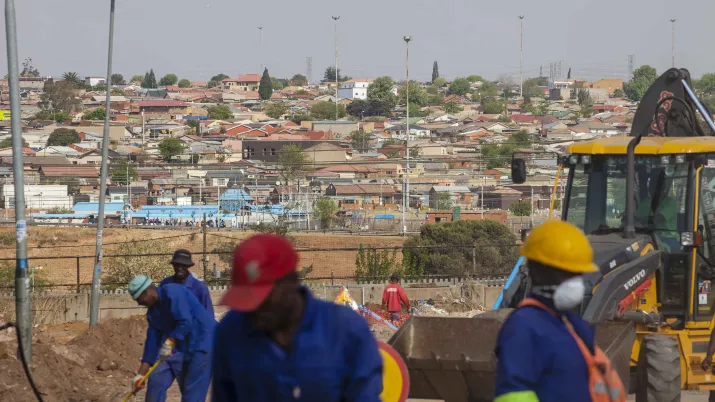
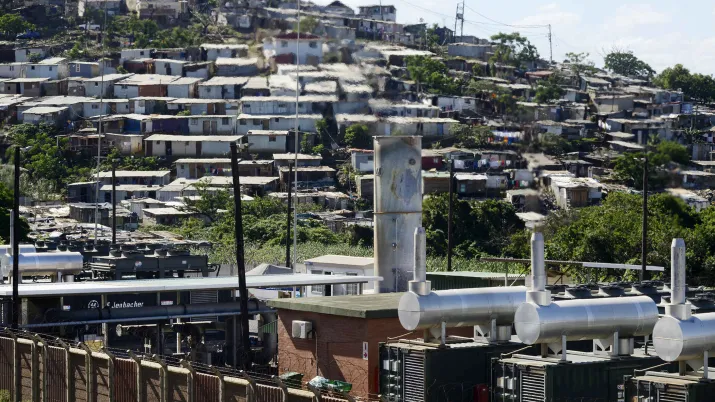
Evaluation of local stimulus effects in South Africa: Jobs and grants programmes
Completed
2022 - 2023



